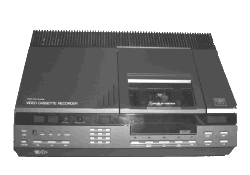Technical
General Construction
On the plus side these VCR's were constructed in a modular fashion with each printed circuit board carrying out a distinct function. On the down side, these many PCB are connected together using plugs, sockets and wire links which are prone to failure. The electronics inside the VCR's is by todays standard fairly straight forward with many discrete components being used together to perform the complex functions required. This means getting hold of components to repair electrical problems is by and large still possible. However this good news is more than wiped out by the fact that it is now near impossible to get hold of mechanical parts such as pressure rollers, capstan motors and video heads. For the most part it is a case of having to break up several machines to get one working.Dry Joints
Like most V2000 models this VCR suffered from problems associated with dry solder joints. Before carrying out anything else it is advisable to check the PCB's for dry joints. In particular the power supply section and it's linear regulators should be checked.Also prone to failure were the drive circuits for the video head actuators. These supplied high voltages to activate the piezo-electric actuators and as such were under stress most of the time. A good maintenance procedure is to replace all the capacitors in this part of the VCR and to resolder all joints.
Video Heads
If the VCR suffers from mistracking first check the voltage drive to the piezo-electric crystals used in the Dynamic Tracking circuits. Video heads for V2000 machines are now rare and extremely difficult to obtain.
